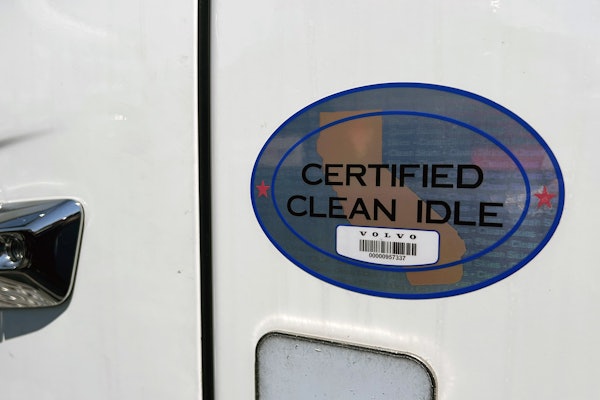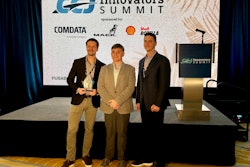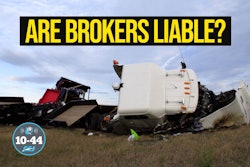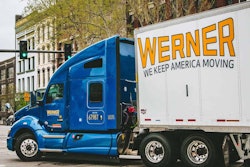It’s a cold, dark morning at San Francisco’s famous Fisherman’s Wharf. While the city sleeps, the wharf is bustling as fresh and frozen fish are loaded into the reefers of waiting trucks, and the race to deliver the seafood on time begins.
The moon is still high, and streetlights are glowing when Don Battaglia, vice president of San Francisco Sea Food Express, leaves his sleeping family and drives to his office a few miles from Fisherman’s Wharf. Battaglia’s workday begins at 3 a.m. and ends after lunch. “It never really ends, though,” he says. Battaglia is always within reach of employees and customers, all day, seven days a week, as he coordinates the tightly synchronized seafood hauling operation.
Don’s father, Jack, president of Sea Food Express, started the 15-truck seafood hauling business in 1960 when he switched from selling bait to hauling fish. “Dad saw the need for on-time seafood hauling and began the business with three small trucks and a handful of clients,” Battaglia says. He works side by side with his father at the warehouse-based office, and he considers his father both a mentor and partner. In fact, many of the customers and some employees go back to the early days of the business, and those contacts contribute to the success of the company.
Hauling seafood is both highly competitive and dependent on near perfect timing. There’s little margin for error in the high-pressure, on-time delivery demands. Breakdowns and unexpected waiting times – inconveniences for many other trucking companies – spell catastrophe for the fresh and frozen food business. Battaglia juggles typical owner challenges like steep fuel prices and rising insurance costs, but his prime considerations are on-time, flawless delivery and service.
According to Battaglia, the two most critical factors in the success of his on-time delivery are a no-excuse, no-waiting policy with shippers and scrupulous equipment maintenance. Both are easier said than done.
Tough tactics with shippers
In seafood hauling, waiting for loads jeopardizes the entire synchronized operation. This crucial link is one that many company owners feel is an “uncontrollable” factor. Not Battaglia. If his drivers are told they will have to wait longer than 30 minutes, they are instructed to call him on the spot. “I get on the phone with the shipper and give him two options. He loads my truck immediately, or I leave the load.” Sometimes, it’s necessary to leave the load to make the point. Battaglia then calls the customer and explains the situation. He says it’s better to make one person unhappy than to delay the tight schedule of 20 other customers.
“We are all in the service business together,” Battaglia says. “Shippers know who will and won’t tolerate long waits. They know I mean business and am willing to walk away if I need to.” Waiting is not an option, and if his customer has to get another truck to pick up their load because of it, he will be looking for another shipper. It’s in everyone’s best interest to keep freight moving. Battaglia says it may take leaving the load once or twice to make the point, but taking a tough stand pays off in the long run.
Pay now or pay later
Battaglia brings the same determination and focus to maintaining his equipment. The company’s 15 Freightliners with Great Dane customized refrigerated reefers have to be kept in tip-top shape. All of Battaglia’s trucks are between 3 and 5 years old. “A breakdown with a load of fresh fish can be a disaster – fish sitting in a trailer doesn’t get any younger,” Battaglia says. He believes developing a good relationship with your service providers is almost as important as one with your customers. “I use shops I trust. It’s too easy to get ripped off or receive poor service these days,” he says. The company uses local Caterpillar dealers for the engines and Freightliner service centers for other work. The trailers are maintained locally, and drivers have a list of established service stations they can use for minor repairs on the road.
Even with careful attention to detail, trucks still break down occasionally. “That’s when you have to have a plan A and B and whatever it takes,” Battaglia says. He runs local trucks in both San Francisco and Los Angeles and several dedicated to the eight- or nine-hour run between the two cities. He says if you know where all your trucks are all of the time, you can handle a breakdown without losing the load. The key is to fix the truck or reload the cargo into a nearby available reefer. “It’s all in the planning. You have to be ready for anything,” Battaglia says.
Running a tight operation
Keeping all the wheels in motion requires hiring and retaining employees, who are trained to meet high expectations. Battaglia attracts drivers via word of mouth offering above average pay, good benefits and a family atmosphere. “If they are paid well, you are more likely to keep them honest and motivated. I never skimp on driver pay,” Battaglia says. In return, he expects his drivers to maintain a tight schedule. Drivers are required to run together, load and unload quickly and stop only for fuel.
Infrequent stopping keeps the trucks on time and reduces the risk of cargo theft. Seafood is a hot target for cargo thieves and is easily fenced. “A parked truck is an easy mark,” Battaglia says. He cautions his truckers against discussing their destinations and loads on the CB and advises looking out for each other.
Other strategies like deliberate deadheading – usually dreaded as a budget buster – can actually work out to be more profitable than hauling a return load, Battaglia says. “I don’t take a load back just to have a load. Sometimes, it’s more cost-effective to get back on time than to risk getting off schedule with a return load. Again, you have to look at the big picture. Is it worth it to take the time to take the load? Often, the answer should be no.”
Ensuring that loads always get to their locations on time is the measure of competition in seafood hauling. Loads like fresh lobster, shrimp, crab and salmon bring top dollar in the fish market. Battaglia has to offer extraordinary service to stand out from all the small companies fiercely bidding for the best loads. “I offer my customers worry-free service,” Battaglia says. The customer doesn’t want to know about the hassles, inconveniences, waiting times or any of the factors that go into on-time delivery. Frankly, they don’t care. They hire me to worry about the details and get the fish from point A to point B. That’s what we do, and we can charge more to do it,” he says.
It’s also almost impossible to break into the close-knit community of food wholesalers and trucking companies who have done business together for generations. In fact, according to Battaglia, more than 90 percent of start-ups fail in the first year largely because they have neither the expertise nor the customer ties.
Running a well-established, family business gives Battaglia the home court advantage. But keeping it running well requires constant attention to his customers in spite of their long-standing ties.
“I grew up with many of my customers’ kids, and now we are all getting our kids together,” Battaglia says. “We have meals at each other’s homes, and we look out for each other. While it’s a family atmosphere, there are also high expectations for excellent service.”
A good reputation is everything in a small community, and word of mouth can work both ways. “Everything that happens gets around,” Battaglia says. If things do go wrong, the best bet is to level with the customer and get back to business. If a company has a good track record, inevitable mishaps are more easily overlooked.
The early morning hours give Battaglia time to spend with his family, which is unusual for trucking company owners. While he is still connected by phone, he has time to coach his daughter’s basketball team and get involved in his children’s extra curricular activities. He’s living the best of all worlds by running an efficient, lean trucking company and having time for family. One thing Battaglia doesn’t do in his free time is salt-water fishing. “I see enough fish every day. If I want to relax, I can drive one of the trucks – but fishing, I don’t think so.”








